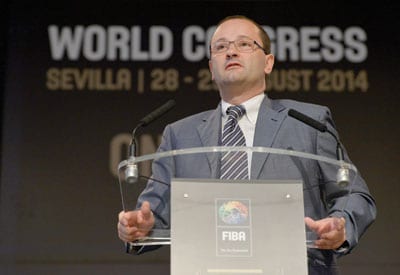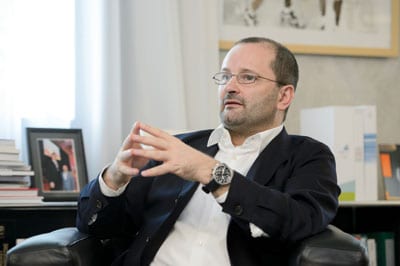FIBA – the world governing body for basketball – is an independent association comprising 215 National Basketball Federations throughout the world. It is recognised as the sole competent authority in basketball by the International Olympic Committee (IOC)
According to FIBA, Euroleague Properties SA, a subsidiary of Euroleague Commercial Assets (ECA), which today organises the Euroleague club competition, wishes to reap the benefits of the basketball ecosystem developed by national federations (players, coaches, referees and thousands of other clubs) without contributing to the foundations of the sport’s pyramid and holding the national teams hostage to serve the interests of six commercially powerful clubs.
We discussed this topic with Patrick Baumann, who has served for many years as Secretary-General of the FIBA, the World Governing Body of Basketball. He joined FIBA in April 1994 and was appointed Deputy Secretary-General following Borislav Stanković in 2003, thereby becoming only the third person to hold the position.
Beyond basketball, Mr Baumann has been appointed to commissions and panels of a large number of sports-related organisations, including the IOC’s Evaluation Commissions for the Beijing and London Olympics. He was elected an IOC Member in 2007. He is also a member of the International Council of Arbitration for Sport (ICAS) and a council member of the Association of Summer Olympic International Federations (ASOIF).
You are a member of the International Olympic Committee (IOC). FIBA is one of the pillars of the IOC and basketball is one of the most important and most commercial Olympic sports. Have you held talks within the IOC about the current situation in European basketball, and what is the stance of the highest international sporting organisation regarding this issue?
– Of course, we are holding regular talks with the IOC. The current situation in European basketball is of interest for a lot for sports and is not only a basketball matter. Clubs are part of the foundation of the sports structure in Europe. They develop players and create coaches and bring new athletes as well as children to sports.
Clubs need to be pushed to excel in reaching the top. This should happen in each country, through the domestic leagues. The pyramid must then continue: the best in each country should have the opportunity to show their talents at the European level. If they don’t succeed, they should try harder the following season. This is the European model that we are trying to protect.
What is at the root of the misunderstanding and the crisis in relations between FIBA and the Euroleague, and where you see a possible compromise?
– There is a difference in philosophy. FIBA’s mission is to promote and develop the game. We care not only about the elite but also about all other clubs around the world, including women, youth and wheelchair basketball. Euroleague is a private organisation that aims at making money in basketball for the benefit of a few clubs.
FIBA cannot accept that Euroleague takes away the best clubs without caring about the consequences on the basketball landscape. If we let the Euroleague model prevail, then the domestic leagues will soon die. As the governing body of basketball, we can’t let this happen.
We have shown our serious intent to negotiate professionally and in good faith during the recent meeting where we proposed that Euroleague Commercial Assets (ECA) organise the Euroleague (EL) as the 1st tier competition and the Basketball Champions League would be the 2nd tier competition. These two competitions would be linked through principles of promotion and relegation of a club, based on domestic results.
The impression in public is that the arguments revolve around money. Considering FIBA’s long tradition and the great impact this organisation has had on basketball’s development, financing and popularisation worldwide, it could perhaps be said that we are talking about a sporting conflict and purely commercial motives. How would you comment on that?
– This has nothing to do with money and FIBA’s aim is not to organise club competitions. That’s why we have founded a company, the Basketball Champions League (BCL), with 10 national leagues. The leagues should be in charge of running the European club competitions.
FIBA’s objective is to create a solid and open house where each club is welcome to enter and climb the stairs all the way to the top. We need to protect this structure for the good of the game.
Both sides will seek justice in court, using the laws of the European Union. What is the basis for FIBA’s claim?
– Undue pressure has been exercised on leagues and clubs with threats of exclusion from Euroleague unless they commit to Eurocup.

Such practices were applied in the case of the Adriatic League and other European leagues. This constitutes abusive behaviour under EU and national laws.
The ECA has also arbitrarily been cherry-picking clubs for Euroleague and Eurocup, which means destroying any commercial and sporting value of domestic leagues and undermining the competitive balance in European basketball.
In essence, ECA wishes to reap the benefits of the basketball ecosystem developed by national federations (players, coaches, referees, thousands of other clubs) without contributing to the foundations of the sport’s pyramid and holding national teams hostage to serve the interests of few commercially powerful clubs.
FIBA cannot accept that Euroleague takes away the best clubs without caring about the consequences on the basketball landscape. If we let the Euroleague model prevail, then the domestic leagues will soon die. As the governing body of basketball, we can’t let this happen
What went wrong during the last negotiations in May? Was the problem only the number of top clubs that will control both sides, or is there something else?
– We held constructive discussions. We have made a clear proposal to Euroleague, and we hope to find an agreement. The discussion is not about the number of clubs. It is about creating the appropriate synergies between Euroleague and the Basketball Champions League, in a transparent, nondiscriminatory and fair environment. It is for this exact reason that we also envisage the operational collaboration between ECA and the Basketball Champions League, not just a simple “cohabitation” in the club business.
We are now waiting for ECA to come back to us with an answer to our proposal.
FIBA communicates and operates through national associations that are members of FIBA, while the Euroleague negotiates with clubs directly. Do the national federations have sufficient authority to implement agreements made in FIBA within their respective countries?
– I think that people often forget one important fact: all those clubs are part of a national federation. They have agreed, freely, to be part of an existing structure in their own country. This comes with rights and obligations. Like in any organisation, you have to respect those obligations. For example, a club cannot just say: “I play the national championship, but I don’t play the national cup”. It’s the same at the international level. A club cannot just decide for itself outside of the structure.
Each national federation must make sure they take the necessary steps in their country that will help the sport to develop. All the different actors should sit around the table and have those discussions at a national level.
The Euroleague resents FIBA’s apparent “use of force” (issuing ultimatums to national associations) in implementing the future format of European club competition. What do you say to that?
– ECA has started to hand-pick the clubs for Euroleague and Eurocup, which basically means destroying any commercial and sporting value of domestic leagues. In response to ECA’s aggressive and illegal behaviour, FIBA Europe decided that, with the exception of the 16 Euroleague teams, and National Federation that supports ECA’s illegal tying practices and allows their leagues or clubs to conclude and/or implement agreements with ECA will automatically lose the right to participate in senior men’s national team competitions organised by FIBA Europe.
The Euroleague’s new concept (16 teams in a so-called closed league) is at odds with FIBA criteria and the obligations of national teams. Can FIBA change something in this regard?
– This is part of our proposal to ECA: to develop a joint calendar, bearing in mind that the calendars of the competitions will respect the calendar of domestic leagues (in particular, not having Euroleague or Basketball Champions League games played on weekends) and the calendar of national teams. FIBA/FIBA Europe is ready to discuss slight adjustments to avoid scheduling conflicts, particularly for the national team windows of November and February.
All clubs participating in the competitions shall release players to national teams in accordance with the existing regulatory framework.
Each national federation must make sure they take the necessary steps in their country that will help the sport to develop. All the different actors should sit around the table and have those discussions at a national level
Spain, as European champion and Olympic runner-up, finds itself in a difficult situation when it comes to the dispute between FIBA and the Euroleague. How far is FIBA prepared to go and is it possible that the Spaniards will not compete in Rio?
– The Spanish Supreme Council of Sport (CSD) has confirmed that the Spanish League (ACB) has no competence to be involved or participate in any way in the process of registering clubs or national teams in international competitions.

These are competencies granted to the Spanish Federation.
Spanish law has implemented the “European model of sport”, and all stakeholders have to comply with the rules of the pyramidal structure of sport in Spain. If this happens, we are confident that Spain can participate in all FIBA competitions. FIBA Europe should first take this decision regarding the European level.
At the 2008 Beijing Olympic, you announced that FIBA would fight for basketball to have 16 teams at the Olympics. Have these plans been abandoned, given the IOC’s sharp propositions when it comes to the total number of athletes at the Games and the fixed calendar?
– We have been trying to add more teams in the Olympics for the last three editions, but as you are well aware, this is a very delicate matter. Each sport would like to have more athletes, and some new sports would like to enter the Olympic programme… At the same time, the number of athletes at the Olympics is not extensible, and the IOC is implementing the agenda 2020, which aims at delivering Games on a human scale.
Our priority for the Tokyo Games is to include 3×3. FIBA made an official bid for 3×3 to join the Olympic programme as a new discipline of the sport of basketball and has been actively promoting it ever since. The development of 3×3 is one of FIBA’s four strategic pillars, and the game is growing fast with an unparalleled digital platform and an impressive competition network which allows for players to go from the streets to the world stage.
What has changed within FIBA’s organisation since the complete authority was centralised in Geneva at the Congress in Istanbul two years ago?
– The basketball family is now more united and has more participation. All these changes will enable us to have more open lines of communication and better understanding among all institutions. FIBA involves more and more basketball stakeholders in the decision-making process. We have incorporated the NBA in our Central Board by having Mark Tatum, NBA Deputy Commissioner and Chief Operating Officer, as its representative. We also approved the inclusion of a player representative, Vlade Divac, who is also the Chairman of the newly-created Players’ Commission.
This is also happening at the European level where two League Representatives were approved by the FIBA Europe Board (Mr Arthur Goethals, President of the Belgian Basketball League, and Mr Marcin Widomski, President of the Polish Basketball League).
Which Olympic qualifying tournaments will you attend? Will we perhaps see you in Belgrade from 4th to 9th July?
– I do not know yet, but I hope so.